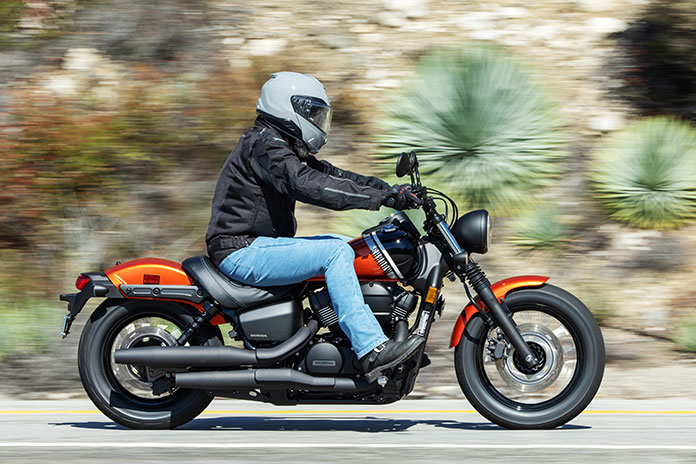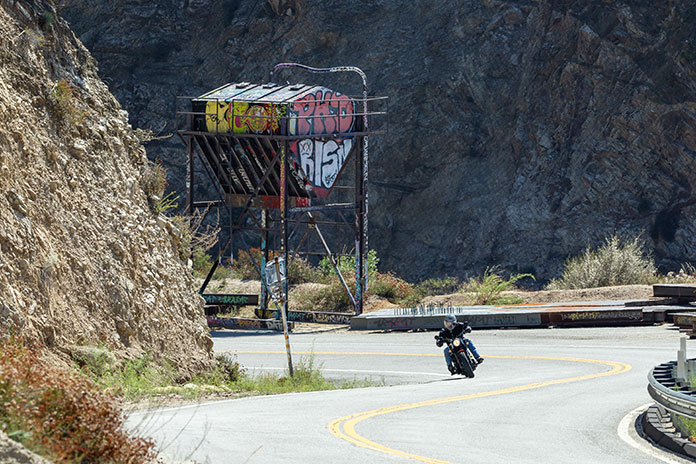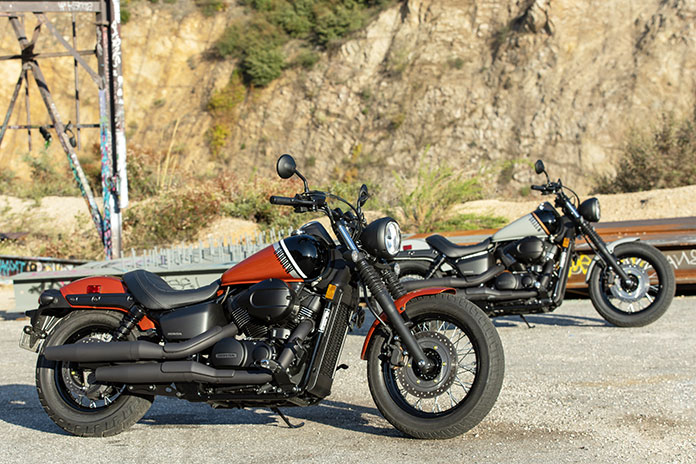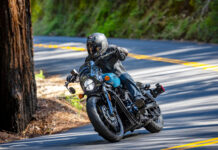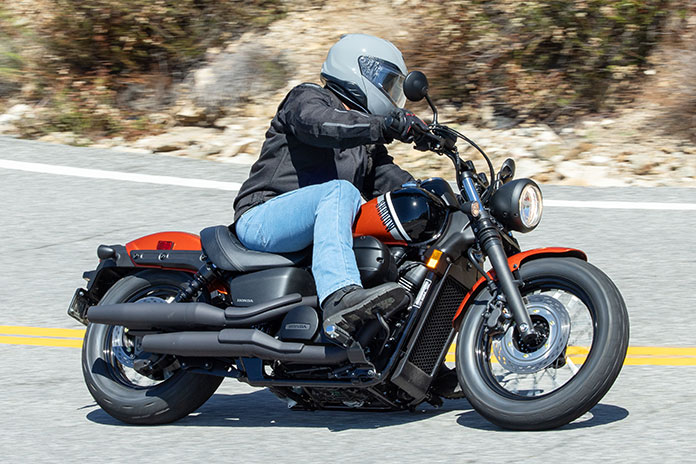
When something has been around for four decades, it’s usually because of a combination of inherent quality and general likability. Take a look at Rider magazine, for example. Next year, we celebrate our 50th birthday. There’s a reason for that. But quality doesn’t live in a vacuum. To survive – and even better, to thrive – there has to be change. Honda has succeeded in finding the next step in the evolution of the Honda Shadow Phantom, and the company hopes the changes, combined with a 40-year history, will help the bobber-style bike succeed in the middleweight cruiser market.
The Spirit of 750
The Honda Shadow was introduced in 1983 with two options. The larger of the two cruisers featured a liquid-cooled 745cc 45-degree V-Twin with SOHC and 3 valves per cylinder. It had a 6-speed gearbox, a slipper clutch, and shaft final drive. More than 19,000 Shadow 750s were sold that year.
Related: Retrospective – 1988 Honda VT800C Shadow
There were several other chapters in the Shadow story, but if we’re following the lineage to the Phantom, significant mileposts included the shift to a 52-degree V-Twin in 1988 with the 583cc Shadow VLX. The 52-degree V found its way to the larger displacement 750cc Shadow ACE in 1998, which dropped down to a 5-speed gearbox, chain final drive, and no slipper clutch. The Shadow Phantom was introduced in 2010 with blacked-out styling (the exhaust was still chrome), the introduction of fuel injection, and a return to shaft drive.
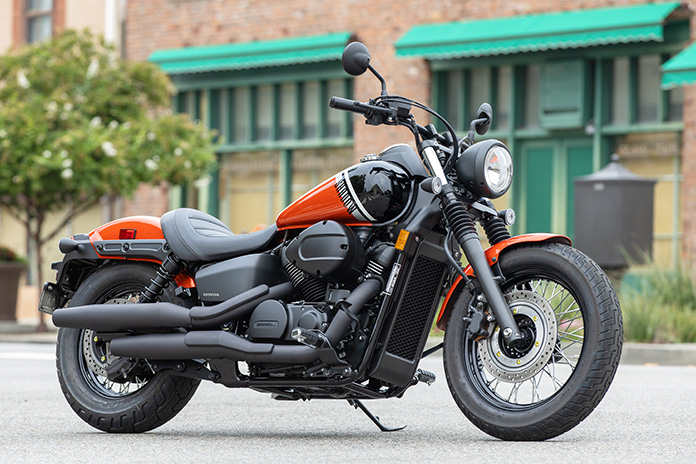
The 2024 Honda Shadow Phantom sees the blacked-out styling now carried through the exhaust – a good look that represents a more modern appeal. It still features a liquid-cooled 745cc 52-degree V-Twin, but machine-cut cylinder head fins add a nice visual contrast that makes the engine pop. There’s also a new two-tone paint scheme on the tank (Deep Pearl Gray or Orange Metallic), LED turnsignals, fork boots, shortened fenders, and a new single seat (a passenger seat and footpegs are available as accessories).
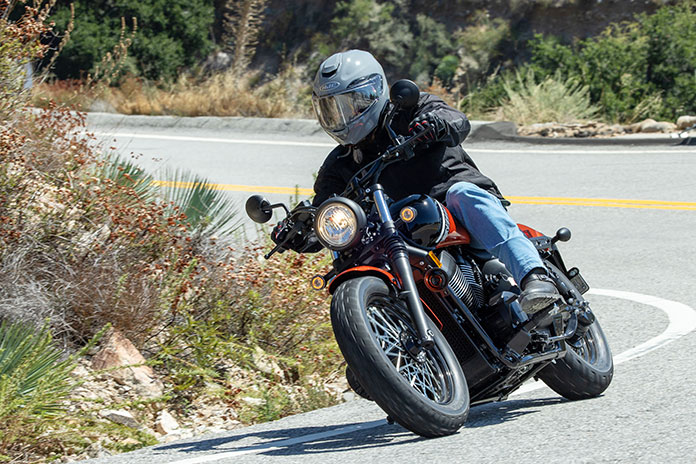
Colin Miller, American Honda assistant manager of public relations, said members of Generations Y and Z are more attracted to Honda’s Rebel platform, partially because of its more aggressive styling, and Honda is leveraging some of that style with the Shadow Phantom. Whereas the Shadow Aero still has the more laid-back appearance of a traditional cruiser with a swept-back handlebar and more relaxed seating, the revamped Phantom takes a more contemporary approach, with a new handlebar and clamp that puts the rider in more aggressive forward position. A graphic during the presentation showed the handlebar position close to that of the Harley-Davidson Forty-Eight.
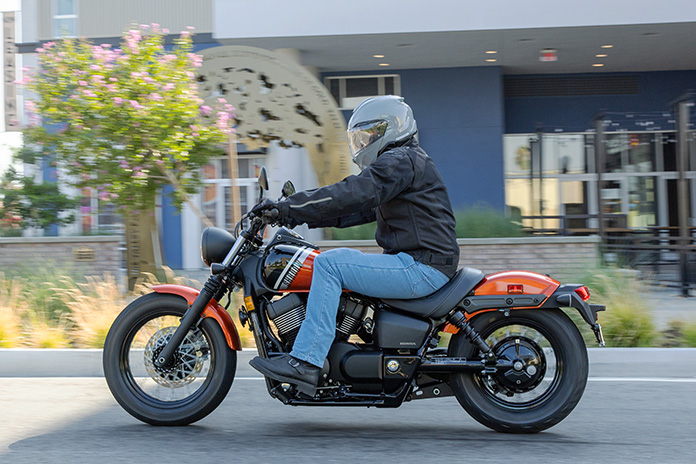
And from a customization standpoint, while the previous model’s rear fender and license plate holder was one piece that had to be cut if a customer wanted to make changes, the holder on the new model can be unbolted to aid customization.
Another significant update to the Phantom is its stopping power. Braking in the front is still provided by a 2-piston caliper gripping a 296mm disc, but the previous rear brake drum has been replaced by a 276mm disc and 2-piston caliper, and a new ABS version is available for an extra $300.
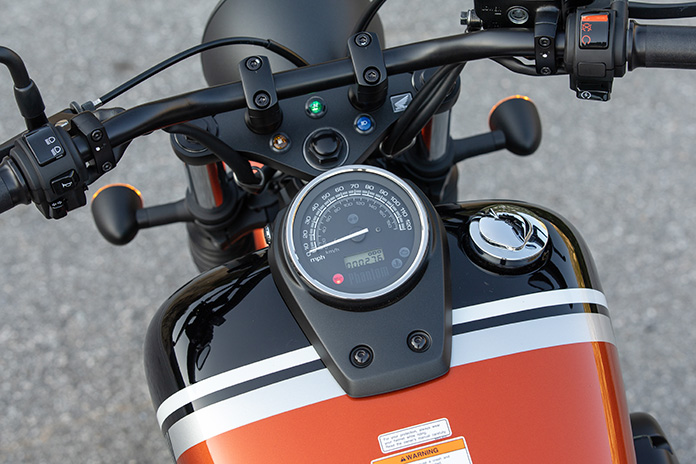
Front suspension travel has been increased by half an inch (to 5.1 inches) but remains the same 3.5 inches in the rear courtesy of dual shocks with five-position spring-preload adjustability. Otherwise, seat height is essentially the same at a very cruiser-like 25.6 inches. Even though fuel capacity has been bumped 0.2 gallon to 3.9, curb weight of the 2024 model is 6 lb lighter at 543 lb.
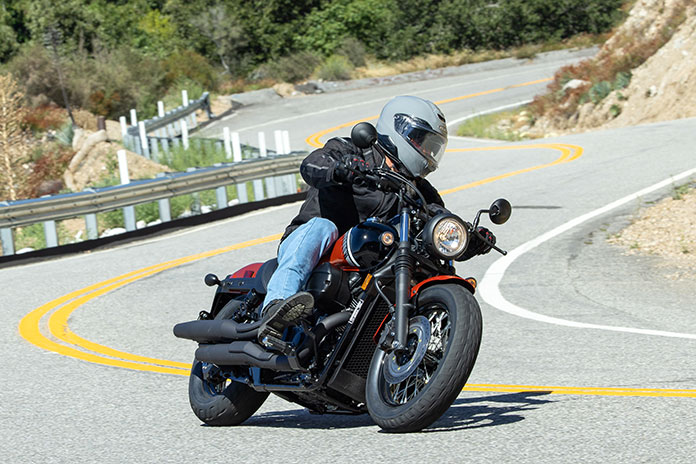
Unlocking the Phantom Zone
The middleweight cruiser market exploded during the Covid pandemic. The wave crested in 2021, but Miller said Honda is hoping the Shadow Phantom will bring in both new riders and existing cruiser fans looking for something new. I don’t know about the younger generation – in more ways than just their riding preferences – but I can say this Gen X cruiser guy sure enjoyed the ride.
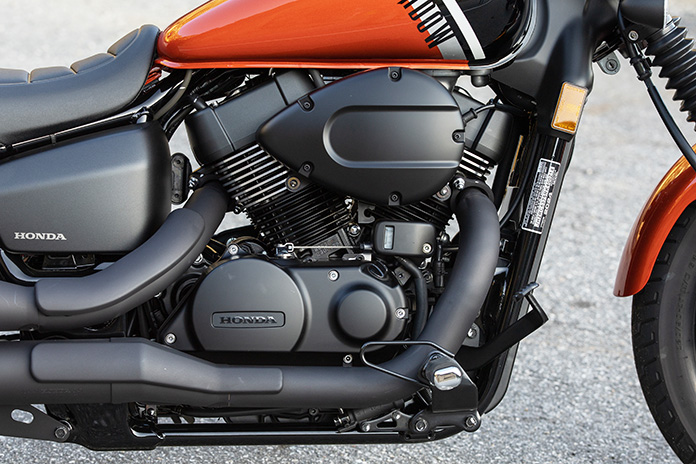
The first thing I noticed when firing up the bike was the rumble, which was surprisingly satisfying for a Japanese bike with the stock exhaust. The Phantom continued to impress as we rolled through the streets of San Dimas, California. When we tested the 2013 Shadow Aero, it made 44.7 lb-ft of peak torque at the rear wheel, with more than 40 lb-ft available between 2,200 and 5,000 rpm. I appreciated that level of low-end grunt when pulling away from intersections in town, and it held its own as we climbed 6,000 feet on State Route 39 to Crystal Lake.
Related: 2013 Honda Shadow Aero Review
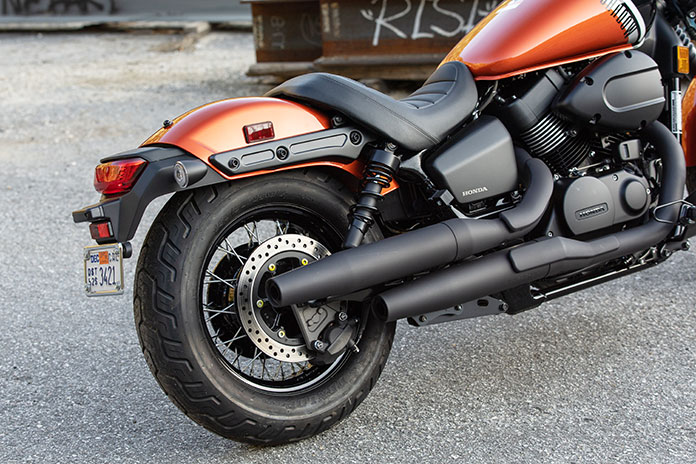
The rear suspension was a little squishy in some of the bumpier parts, but that was likely a result of the preload being set for someone a little lighter than my two-plus bills. Fortunately, the new saddle is nice and cushy and didn’t give me any grief during the four hours I was on it.
GEAR UP
- Helmet: HJC RPHA 91 Modular
- Jacket: Fly Racing Coolpro Mesh
- Gloves: Fly Racing Street Surveyor
- Pants: Highway 21 Blockhouse Jeans
- Boots: Highway 21 Low Primary Engineer
The pull on the clutch lever was a little heavy, and I would rate it “medium.” Since I own an older cruiser, it’s not anything new to me, but many bikes today are equipped with slip/assist clutches, and once you get used to this feature, you notice when it’s not there. I was okay with the lever pull – although a slip/assist clutch would’ve lightened it – but there was a moment going up the twisty, narrow one-way route to Crystal Lake where a quick downshift, combined with some debris in the road, gave a hop of the rear wheel on a curve that was a little bracing.
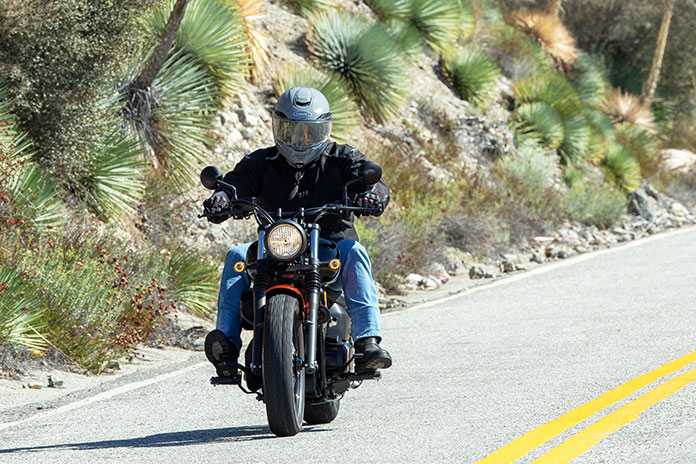
At just $8,399 ($8,699 for the ABS version), the 2024 Honda Shadow Phantom may not have all the bells and whistles, but it is a very attractive proposition for either a new rider or someone looking to add another steed to their stable from a segment without a lot of competition.
Only Breath and Shadow
I had only one other issue with the Phantom. The bike has a decent 27.4-degree lean angle. However, when I put the arch of my boot on the forward-mount footpegs, if I didn’t want my toe resting on the brake pedal, the heel of my boot found the road surface before the pegs did. This required a shifting of my right boot to various positions, none of which were as comfortable or confidence-inspiring as having the peg positioned directly under my arch.
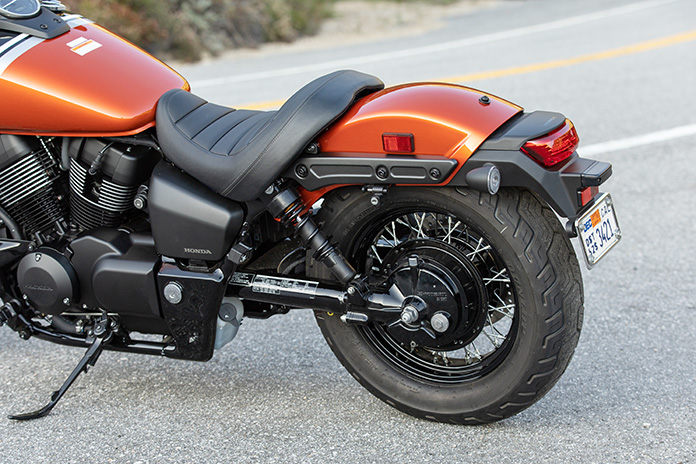
This is not to say that I was high-speed slaloming up the canyon. In fact, I was the most conservative of the riders that day on the winding SR-39. As to those peg scrapes, I was once advised by my colleague and editor-in-chief of our sibling publication American Rider, Kevin Duke: “Ride your own ride, but challenge your limits when your confidence grows.”
So I did. Most riders won’t treat the Honda Shadow like a sportbike, but it certainly responded to my prodding enough to make it a spirited ride up the winding SR-39. When it comes to riding my own ride, I like to cruise, take in the scenery, breathe the air, and get my heart pumping enough to remember I’m alive.
If you are of a like mind, you’ll be very happy with the Phantom. And for those of you wondering if it’ll haul a little ass, the Phantom has something for you as well, as I can attest based on the taillights winking in the distance ahead of me from some of the other riders in my group.
The new Phantom has brought the Shadow into the light, and it looks to be a bright future indeed.
Check out more new bikes in Rider‘s 2024 Motorcycle Buyers Guide
2024 Honda Shadow Phantom Specs
- Base Price: $8,399
- Website: Powersports.Honda.com
- Warranty: 1 yr., unltd. miles
- Engine Type: Liquid-cooled, transverse 52-degree V-Twin, SOHC w/ 3 valves per cyl.
- Displacement: 745cc
- Bore x Stroke: 79.0 x 76.0mm
- Transmission: 5-speed, cable-actuated clutch
- Final Drive: Shaft
- Wheelbase: 64.6 in.
- Rake/Trail: 34 degrees/6.4 in.
- Seat Height: 25.6 in.
- Wet Weight: 543 lb
- Fuel Capacity: 3.9 gal.
- Fuel Consumption: 56 mpg (claimed)
See all of Rider‘s Honda coverage here.

